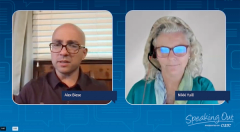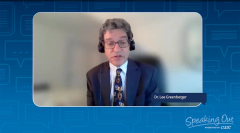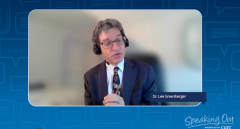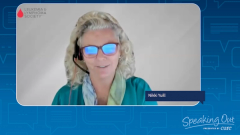
How patients with leukemia and lymphoma can explore clinical trial enrollment

As part of its Speaking Out video series, CURE spoke with Nikki Yuill, oncology social worker and director of the Leukemia & Lymphoma Society’s Information Resource Center, about some of the challenges faced by patients.
Episodes in this series

Transcription:
Biese: Hi, my name is Alex Biese. I'm the assistant managing editor of CURE magazine, and in this edition of the "Speaking Out" video series, on behalf of the Leukemia & Lymphoma Society, we're speaking with oncology social worker and director of LLS' Information Resource Center Nikki Yuill about the process of seeking treatment. Nikki, thank you so much for taking some time to talk today.
Yuill: You're very welcome. It's a pleasure to be here.
Biese: So when discussing patients with leukemia and lymphoma, who are the candidates for treatment? And then conversely, what are some potential patient populations that are kind of less ideal candidates for treatment?
Yuill: Yeah, great. Well, you know, ideally, we want all blood cancer patients to have access to the best treatments for their disease. Even in our subset of blood cancer patients who are diagnosed with let's say, an indolent lymphoma, or possibly CLL, where they are in what's called 'watch and wait' or active surveillance where they don't actually need to start treatment right away, it's still really important for these patients to be even considered for potential participation in clinical trial, and that they're being monitored closely.
We want all blood cancer patients to be able to explore clinical trials as a treatment option at any point in their diagnosis, including those who are newly diagnosed, and of course, especially those who may be relapsed and refractory. Now, there is always going to be a very small subset of patients that may have an illness that is refractory and they're needing to transition into palliative care or palliative care along with hospice care, end-of-life care. Those are a really difficult subset of patients. But again, we want to make sure no matter where people are in their journey, that they have access to the support and care that they need.
Biese: Absolutely, I think that makes all the sense in the world, even that care in that moment is monitoring or whatever it has to be, just making sure everyone is getting the attention and care that they need that makes all the sense in the world. Given the array of treatment options that are currently available, and the fact that more and more becoming available every year, how can a patient and their care team decide on the best course of care for them?
Yuill: Yeah, this is getting more and more complicated as we have this wonderful problem, I guess, of having lots of treatment options that we didn't have even let's say five years ago for many of our blood cancer patients.
But you know, one thing that we always want to keep in mind throughout any part of their journey is clinical trials. Clinical trials are the primary vehicle for developing new treatments for patients (with) cancer. And for many patients, this could provide the best treatment option possible for their cancer, yet we know that only a small fraction ultimately enroll in a clinical trial. So this part is really important. And of course, there's also vastly underrepresented groups within that clinical trial subset. So again, I put a little plug in for clinical trials at this point. It's really important, whether they're newly diagnosed (or if) they haven't started treatment yet or maybe again, those patients whose disease didn't respond, or it came back after treatment, or maybe they're on maintenance therapy and into some type of survivorship, it's still important that these patients be looked at for a potential clinical trial.
And when looking at clinical trials, you know, one of the things we want to do is overcome barriers. How do we get more people to participate? How do we get people access to even know that what their treatment options are?
The second piece is those conversations with their health care team and helping patients and families, and this is important for caregivers as well. What questions should we be asking to know what all of our treatment options are before we make that informed decision? So talking, and again, we go back to communicating with your doctor and your healthcare team and knowing what questions to ask to make sure that all options are considered. I will tell you at LLS, our blood cancer patients that are interested in a clinical trial, we will refer them over to our clinical trial nurse navigators in our free Clinical Trial Support Center. This is one-on-one, individualized care and support through the entire clinical trial search process and even beyond enrollment if there's still support needed after that. So I'll stop there, if that's where you are going with the question.
Biese:Yes, and so what questions should patients be asking regarding clinical trials? What sorts of conversations should they be having with their doctors to identify if there is a trial out there that is right for them and that they are an appropriate fit for?
Yuill: Absolutely. Well, I think that that what you just said is that initial question to your provider, even if your provider has not brought it up themselves, you should empower yourself and patients should be empowered to ask, 'What clinical trials might I be a candidate for? And how do I initiate that search? I really want to know, I want to make sure that all of my options are out on the table, and then we can have that discussion about the pros and cons and maybe why I wouldn't be eligible for certain trials.'
But it's asking that question and empowering patients and families, to even inquire about clinical trials to make sure that it's not missed, that is the start. And again, we offer this this service absolutely for free where patients can reach out to our one of our clinical trial nurses, and they will be literally walked one on one all the way through the process and take that information, take the trials that come up as show(ing) potential eligibility and have patients take that back to their treatment team, back to their physician where they can have those more nuanced and in-depth discussions about eligibility. (It's) really, really important for people to know that there's help out there and they don't have to do all of that research themselves (and) much better to have an expert, such as a clinical trial nurse navigator, help with that process.
Biese:And finally, to circle back to one topic you had mentioned a couple of minutes ago. Are there efforts or initiatives underway to increase and expand clinical trial enrollment? Because as you said, that is that is a real issue right now, patient representation in trials.
Yuill: Yeah, absolutely. This is one big part of our mission here at LLS, not just increasing the numbers of patients that are enrolled in clinical trials, but also paying very special attention to diversity in clinical trials and representation. And we have a couple of different programs that I would like to mention. One of them is our impact grants that (are) also part of the diversity in clinical trials. Our Office of Public Policy is also involved at a state and federal level in efforts to increase diversity in clinical trial enrollment. And then we also have research grants that are specific to increasing enrollment in rural areas in clinical trials. So again, this is an area that's near and dear to LLS.
Biese:Well, Nikki, thank you so much for shedding light on some of these topics today. It is very much appreciated. Hope you have a great day.
Yuill: Thank you.
Transcription edited for clarity and conciseness.
For more news on cancer updates, research and education, don’t forget to








